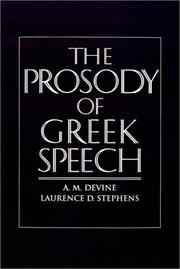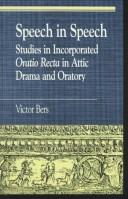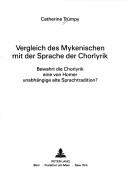| Listing 1 - 5 of 5 |
Sort by
|

ISBN: 1280527056 0195359038 1429405775 9781429405775 9781280527050 9780195373356 0195373359 9786610527052 6610527059 0195085469 9780195085464 019972413X 0197705022 Year: 1994 Publisher: New York Oxford University Press
Abstract | Keywords | Export | Availability | Bookmark
 Loading...
Loading...Choose an application
- Reference Manager
- EndNote
- RefWorks (Direct export to RefWorks)
This study interprets ancient Greek verse texts and musical settings in the framework of a theory of prosody based on cross-linguistic evidence and experimental phonetic and psycholinguistic data. It reconstructs the syllable structure, rhythm, accent, phrasing and intonation of Greek speech.
Greek language --- Oral communication --- Oral transmission --- Speech communication --- Verbal communication --- Communication --- Classical languages --- Indo-European languages --- Classical philology --- Greek philology --- Metrics and rhythmics. --- Spoken Greek. --- Greek language - Metrics and rhythmics. --- Greek language - Spoken Greek. --- Oral communication - Greece.

ISBN: 0195085469 9780195085464 Year: 1994 Publisher: New York: Oxford university press,
Abstract | Keywords | Export | Availability | Bookmark
 Loading...
Loading...Choose an application
- Reference Manager
- EndNote
- RefWorks (Direct export to RefWorks)
The reconstruction of the prosody of a dead language is, on the face of it, an almost impossible undertaking. However, once a general theory of prosody has been developed from reliable data in living languages, it is possible to exploit texts as sources of answers to questions that would normally be answered in the laboratory. In this work, the authors interpret the evidence of Greek verse texts and musical settings in the framework of a theory of prosody based on crosslinguistic evidence and experimental phonetic and psycholinguistic data, and reconstruct the syllable structure, rhythm, accent, phrasing, and intonation of classical Greek speech. Sophisticated statistical analyses are employed to support an impressive range of new findings which relate not only to phonetics and phonology, but also to pragmatics and the syntax-phonology interface.
Greek language --- Oral communication --- Metrics and rhythmics. --- Spoken Greek. --- -Greek language --- -Oral communication --- -Oral transmission --- Speech communication --- Verbal communication --- Communication --- Classical languages --- Indo-European languages --- Classical philology --- Greek philology --- Metrics and rhythmics --- Spoken Greek --- Oral transmission --- Greek language - Spoken Greek. --- Oral communication - Greece. --- Greek language - Metrics and rhythmics.

ISBN: 0847684490 0847684504 9780847684502 Year: 1997 Publisher: Lanham (Md.): Rowman & Littlefield,
Abstract | Keywords | Export | Availability | Bookmark
 Loading...
Loading...Choose an application
- Reference Manager
- EndNote
- RefWorks (Direct export to RefWorks)
Greek drama --- Oratory, Ancient --- Greek language --- Speech in literature. --- Rhetoric, Ancient. --- Théâtre grec --- Eloquence antique --- Grec --- Parole dans la littérature --- Rhétorique ancienne --- History and criticism. --- Spoken Greek. --- Histoire et critique --- Grec parlé --- Speeches, addresses, etc., Greek --- Oral communication --- Oratory, Ancient. --- Théâtre grec --- Parole dans la littérature --- Rhétorique ancienne --- Grec parlé --- Greek drama - History and criticism. --- Speeches, addresses, etc., Greek - History and criticism. --- Greek language - Spoken Greek. --- Oral communication - Greece.
Book
ISBN: 9780691144412 9781400832446 Year: 1999 Publisher: Princeton, N.Y. Princeton University Press
Abstract | Keywords | Export | Availability | Bookmark
 Loading...
Loading...Choose an application
- Reference Manager
- EndNote
- RefWorks (Direct export to RefWorks)
Greek drama --- Women and literature --- Greek language --- Gender identity in literature. --- Sex role in literature. --- Speech in literature. --- History and criticism. --- Sex differences. --- Spoken Greek. --- Athens (Greece) --- Intellectual life. --- Sociology of the family. Sociology of sexuality --- Theatrical science --- Antiquity --- Athens --- Grec (langue) --- Rôle selon le sexe --- Théâtre grec --- Femmes et littérature --- Drame satyrique grec --- Différences entre sexes --- Dans la littérature --- Histoire et critique --- Grèce --- Athènes (Grèce) --- Histoire --- Gender --- History --- Lecture --- Language use --- Theatre --- Book --- Rôle selon le sexe --- Théâtre grec --- Femmes et littérature --- Différences entre sexes --- Dans la littérature --- Grèce --- Athènes (Grèce)

ISBN: 3261035617 Year: 1986 Volume: 32 Publisher: Bern
Abstract | Keywords | Export | Availability | Bookmark
 Loading...
Loading...Choose an application
- Reference Manager
- EndNote
- RefWorks (Direct export to RefWorks)
Poetry --- Classical Greek language --- Comparative literature --- Civilization, Mycenaean --- Greek language --- Greek poetry --- Civilisation mycénienne --- Grec --- Grec (Langue) --- Poésie grecque --- Spoken Greek --- Dialects --- History and criticism --- Grec parlé --- Dialectes --- Histoire et critique --- Homer --- Language --- Mycenae (Extinct city) --- Mycènes (Ville ancienne) --- Civilization, Mycenaean, in literature --- Epic poetry, Greek --- -Greek language --- -Classical languages --- Indo-European languages --- Classical philology --- Greek philology --- Greek epic poetry --- Epic poetry, Classical --- Mycenaean influences --- -Homer --- -Knowledge --- -Language and languages --- Knowledge --- -Mycenae (Extinct city) --- -Mikínai (Extinct city) --- Mukenai (Extinct city) --- Mycena (Extinct city) --- Mycenae (Ancient city) --- Mycenes (Extinct city) --- Greece --- In literature --- Antiquities --- Civilization, Mycenaean, in literature. --- Mycenaean influences. --- Spoken Greek. --- Language and languages. --- Mycenae (Extinct city). --- In literature. --- -Mycenaean influences --- -In literature --- -Hóiméar --- Hūmīrūs --- Homeros --- Homerus --- Gomer --- Omir --- Omer --- Omero --- Ho-ma --- Homa --- Homérosz --- האמער --- הומירוס --- הומר --- הומרוס --- هومر --- هوميروس --- 荷马 --- Ὅμηρος --- Гамэр --- Hamėr --- Омир --- Homero --- 호메로스 --- Homerosŭ --- Homērs --- Homeras --- Хомер --- ホメーロス --- ホメロス --- Гомер --- Homeri --- Hema --- Pseudo-Homer --- Pseudo Omero --- -Greek epic poetry --- Homère --- Civilisation mycénienne --- Poésie grecque --- Grec parlé --- Mycènes (Ville ancienne) --- Classical languages --- Mikínai (Extinct city) --- Hóiméar --- Language.
| Listing 1 - 5 of 5 |
Sort by
|

 Search
Search Feedback
Feedback About UniCat
About UniCat  Help
Help News
News